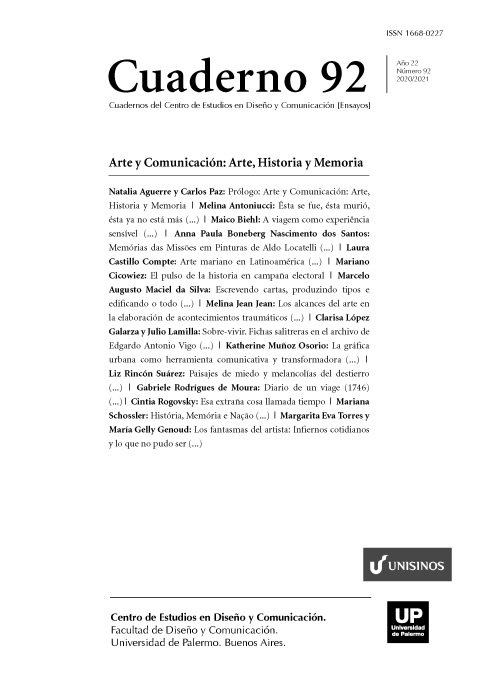Esa extraña cosa llamada tiempo
Abstract
What does it mean to be contemporaries of something? Why do grammars, artistic, school and literary discourses organize and organize in a certain way in front of the problem of time and memory: their conception, their impact on subjectivities? Is time a scarce, linear, ephemeral good, like a commodity? This text does not propose closed answers to any of these questions, on the contrary, it rehearses some reflective journeys and rescues fragments to travel through the territory of time in which modernity defeated sacred archetypal time, and imposed a way of conceiving and teaching the value of linear and historical time as the only possible story and its current transformations. At the same time, he proposes some conceptualizations from historical science and from literature and other artistic disciplines to think about the theme of time in contemporaneity, in a world inhabited by communication devices in constant transformation.
References
Agamben, G. (2008). “¿Qué es lo contemporáneo?”. Disponible en: https://app.luminpdf.com/viewer/o7CSZTR244fimphqC
Borges, J. L. (1974). “Nueva refutación del tiempo” en Otras inquisiciones, Obras completas. Buenos Aires, Argentina. Ed. Emecé.
Braudel, F. (1968). La Historia y las ciencias sociales. Madrid, España. Ed. Alianza.
Eliade, M. (1985). Lo sagrado y lo profano. Barcelona, España. Edición Labor.
Ginzburg, C. (2010). El hilo y las huellas. Lo verdadero, lo falso, lo ficticio, Buenos Aires, Argentina. Ed. FCE.
Huergo, J. (2017). La educación y la vida. Un libro para maestros de escuela y educadores populares. Facultad de Periodismo UNLP. EPC.
McLaren, P. (1998). Pedagogía, identidad y poder. Santa Fe, Argentina. Ed. Homo Sapiens.
Molina, M. (2018). “Perder el tiempo. La hora libre como experiencia”. Buenos Aires, Argentina. Ed. S.D.
Pineau, P. (2016). “¿Por qué triunfó la escuela?, o la modernidad dijo. ‘esto es educación’ y la escuela respondió: ‘yo me ocupo’”, en Pineau, P., Dussel, I.,y Caruso, M., La escuela como máquina de educar. Buenos Aires, Argentina. Ed. Paidós.
Proust, M. (2010). El tiempo recobrado. Buenos Aires, Argentina. Ed. Losada.
Rinesi, E. (2003). Política y tragedia. Hamlet, entre Maquiavelo y Hobbes. Buenos Aires, Argentina. Ed. Colihue.
__________. (2017). “Clases en Seminario Restos y desechos. Tragedia y filosofía política”. La Plata, Facultad de Humanidades y Ciencias de la Educación-UNLP, n/a.
Recalcati, M., (2016). La hora de clase. Barcelona, España. Ed. Anagrama.
Shakespeare, W. (2007). Hamlet Buenos Aires, Argentina. Ed Gradifco. Steiner, G. (2011). Gramáticas de la creación. Buenos Aires, Argentina. Ed. Debolsillo.
Los autores/as que publiquen en esta revista ceden los derechos de autor y de publicación a "Cuadernos del Centro de Estudios de Diseño y Comunicación", Aceptando el registro de su trabajo bajo una licencia de atribución de Creative Commons, que permite a terceros utilizar lo publicado siempre que de el crédito pertinente a los autores y a esta revista.


